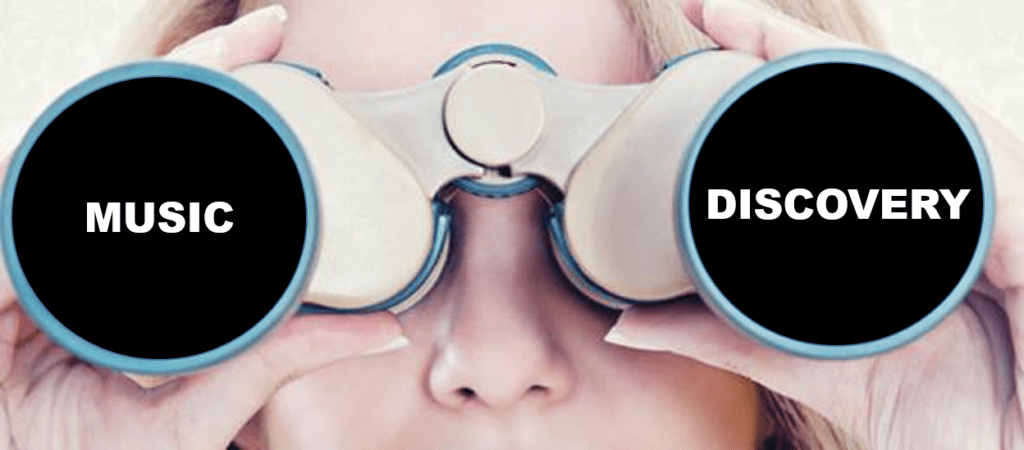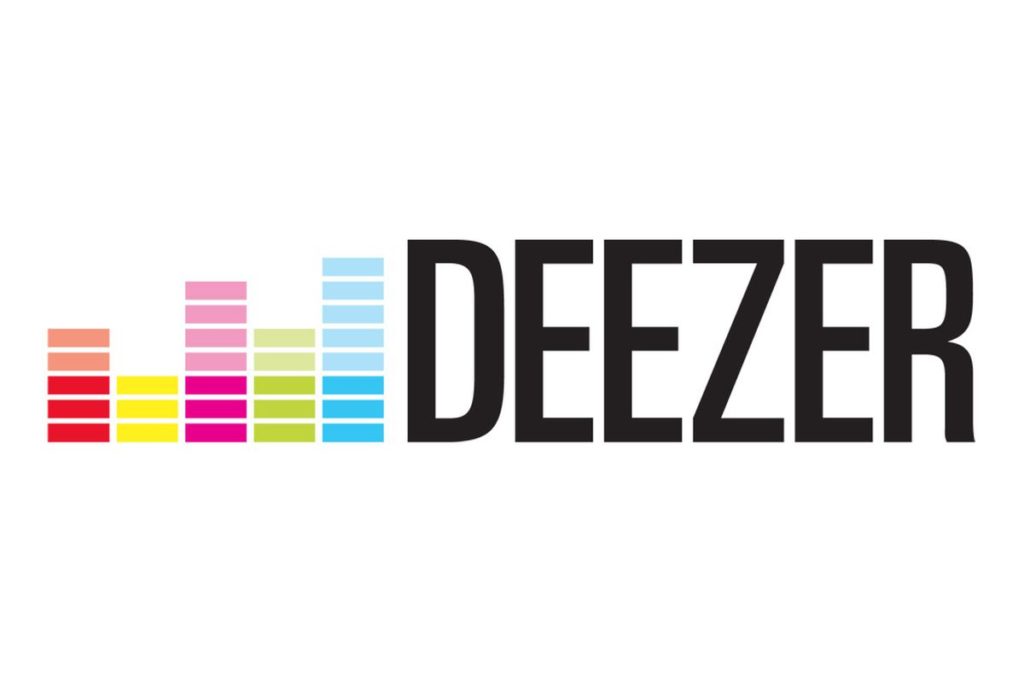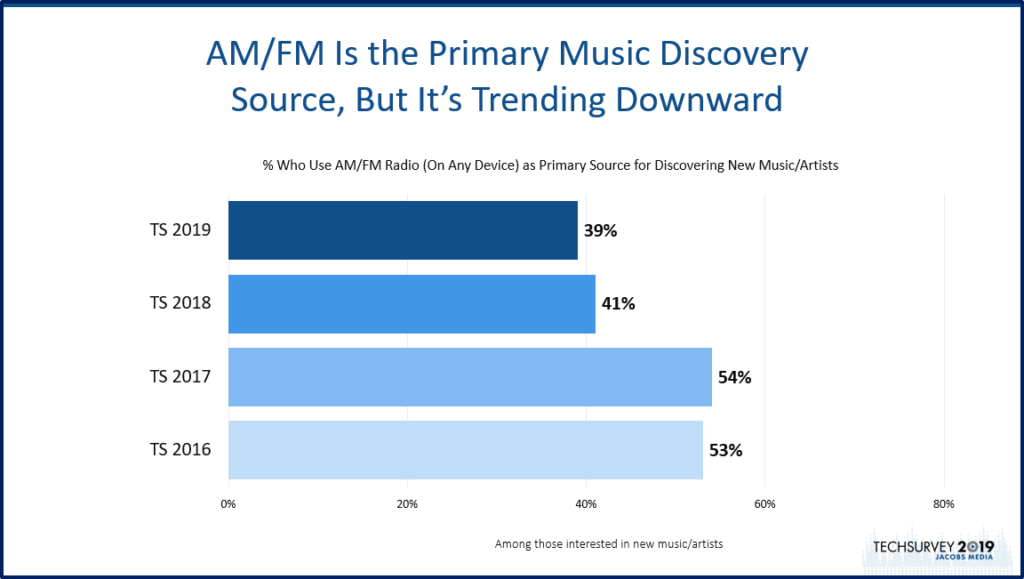
Part of the rites of growing up is developing an appreciation for the music around you. Discovery tends to start in the adolescent/preteen years. But over the last decade or so, music discovery patterns have been disrupted (like everything else). This blog post from February 2019 touched on some of these changes.
The chart below from Techsurvey 2019 depicted a declining environment for new music discovery on broadcast radio. To put things in perspective, the percentage for radio ticked down to 38% in 2020, and even further down in 2021 to 36%. So, the trend continues.
And we’re at a point with some radio formats where stations are playing less new music than ever. What does all of that say about the state of radio today. Or the state of the music industry today?
To get answers about the future, lets go back to the past for clues. – FJ
Believe it or not, I still have friends in the record label community, despite my lurid past as “The Classic Rock guy.”
And just about every conversation is another Kabuki dance about whether radio plays enough new music versus whether there’s any good music to play. It’s a chicken-egg thing. Stations are loath to play new music they don’t believe in. And labels won’t continue to discover, sign, and record artists that aren’t going to receive airplay.
Of course, I’m talking about the world of Rock music. With Country, Hip-hop, and other genres, it’s a totally different story as we saw the other night on the Grammy Awards show.
 Like many rock programmers of a certain age, I vividly remember the days when we didn’t have enough current slots to accommodate all the great new music coming out. Scores and scores of artists had developed strong followings. The really good stuff by established groups had to get played – now. Cutting-edge stuff debuted at night or overnights. Everything else had to wait its turn.
Like many rock programmers of a certain age, I vividly remember the days when we didn’t have enough current slots to accommodate all the great new music coming out. Scores and scores of artists had developed strong followings. The really good stuff by established groups had to get played – now. Cutting-edge stuff debuted at night or overnights. Everything else had to wait its turn.
The debut of a new album from Floyd, Journey, or AC/DC signaled their respective fan bases to come alive, often waiting in line at record stores to be among the first to buy it. The announcement of a new single by the Stones, U2, or Bob Seger actually helped stations “set occasions” that would have been powerful had PPM been around during those halcyon days of Album Oriented Rock radio – or as it was known as back then, AOR. As a PD, getting your hands on that new song – even a minute ahead of the competition – served as a little victory.
Back then, AOR excelled with 12-34 year-olds – the “sweept spot” of Baby Boomers. They were the target, long before the sweeping dictates of 25-54 buys clamped down on radio in the Eighties. They had money, interest, and enthusiasm for new music. And radio had their attention.
Obviously, this was a completely different universe than the Rock format finds itself in today. Everyone made a lot of money. And played a lot of new music because it was plentiful, and the audience demanded it.
Fast-forward to today. A research study conducted last year by Deezer, a streaming music company, reveals a condition they call “musical  paralysis.” That’s when consumers lose their interest in new music.
paralysis.” That’s when consumers lose their interest in new music.
Deezer interviewed 5,000 adults in the UK, the USA, Germany, France, and Brazil. And while the onset of “musical paralysis” varies considerably by country, the average fans hits the wall at around 28 years-old.
Covered in Digital Music News by Daniel Sanchez, the Deezer study shows that in America, most people’s peak music discovery period occurs when they’re 24½ years-old. But “paralysis” sets in around the time they reach they’re 30th birthday.
Interestingly, the top excuse for gravitating away from the new music scene is a lack of time, demanding jobs, and a sense of music overload.
Yet, there’s an important caveat. A majority of respondents – 60%, in fact – say they’d love to hear more new music if they just had more time.
So, where do consumers who have an interest in new music and new artists do their discovering?
Our Techsurveys tell an evolving story. Now, keep in mind that most respondents are radio listeners to begin with – mostly members of station email databases.
That said, there’s a pattern when we look back at the role broadcast radio plays in the discovery of new music. In our survey, radio is well ahead of other sources – satellite radio, streaming services, YouTube, and even friends and family. That’s the good news.
But its primacy over these other platforms is slipping. Just three years ago, a majority of Techsurvey respondents pointed to radio as their go-to source.
Here in our brand new, yet-to-be-released 2019 study, we see radio’s advantage is fading:

Part of the new music erosion radio may be experiencing could be emanating from the aging of the medium and its audience. And while no one is tracking this, chances are good that less new music is collectively being played since the dawn of the PPM Era.
But the Deezer study suggests something potentially interesting. If there was a way for a service, a platform, or a medium to efficiently expose audiences to new bands, new genres, and new releases – a clear, simple, and trustworthy curation process – you wonder whether there could be a “there there” for broadcast radio. Many stations also have credible personalities who can also provide much-needed guidance for the listening audience – new music Sherpas, if you will.
When it comes to “spins” and conventional exposure, many radio stations may not provide enough support to facilitate discovery. But given the growing on-demand nature of media consumption, broadcasters could be providing web and app tools and features that could make it seamless and easy for the harried, multi-tasking consumer to play catch-up with the new music scene.
easy for the harried, multi-tasking consumer to play catch-up with the new music scene.
It might also give radio brands a better chance to simply and inexpensively create web content that’s sticky, attractive, and marketable. The fact the Deezer points to lack of time, rather than lack of interest as the driver behind “musical paralysis” makes you wonder if the music industry world has slipped into the same type of jumbled overcrowded that has retarded podcasting’s growth.
Too much choice, too many sources, too many gadgets – and not enough time. Those are problems that someone really smart could solve.
Back when I was a programmer, you discovered new music from one or two local radio stations – and then you read about the artists in Rolling Stone. Today, discovery has become democratized – and that’s a good thing. But it has also become ubiquitous, scattered, and undependable, making the new music terrain overly abundant, confusing, and impossible for someone with a job, a family, or a life to navigate.
Radio performed a valuable service in the last century when American audiences coveted new music discovery.
Could it play a different – but very key role – in the new music environment today?
- Media And Technology In 2025: Believe It Or Not! - April 18, 2025
- In Radio, You Just Never Know - April 17, 2025
- The Secret To Making A Great Podcast (And Great Radio) - April 16, 2025





As a 65 year old, lifelong music obsessive my opinion is automatically invalidated when the sort of research is conducted for these projects. Considered unusable data, it is ejected from the pile at the same rate new “rock” music has been excised from playlists everywhere that isn’t “boutique listening, while actual human filters are now all but extinct in the modern broadcast. There has been and will continue to be, wonderful music released as long as we inhabit the planet. That is not the problem and IMHO never has been.
Well stated, Mike. Very much appreciate your POV.
I am fortunate to be part of the airstaff at the Triple A station WXPK (107.1 The Peak) in suburban NYC. A big part of the playlist is new music … and there is A LOT of really great stuff being made. Pandemic lockdown seemed – in many cases – to yield some pretty amazing music. I wouldn’t know about most of it if not for the fact that I’m playing it (and, for the most part, loving what I’m playing).
You have generally chosen your gigs wisely, my friend. You seem to almost always end up somewhere where the music matters, and your cultured opinions are heeded and appreciated. Well played.
Another great read!
I think that sometimes the “a million choices” gets overwhelming, (think about when you’re trying to pick something to watch and you end up choosing something you know because you can’t choose which new one to watch because there’s so much) that people actually default to things they know because it brings them comfort. There’s no risk. If there are too many things to choose from and you only have time for one, the stress of choosing poorly can affect a person.
The “there’s no good new music” thing is getting really old to me, personally. People our age have been saying that since there was music. The deal is, these are the people in power now. I do believe a very small circle of people run the charts. Not like back in the day. When 10 guys choose the new music for 200 stations, and they don’t like the new music, it affects the perception of everyone from the artists and producers to the jocks on air to the consumer. You believe what you hear all the time.
I also default back to R&R cutting small markets out of reporting. The minute that happened, the music breakers were cut out of the mix. The “make it or break it” features that draws the audience in and listens to their opinions, gone. The stations with the room to break music and some of that risky music, gone. It’s the nature of the radio world right now, but when that was gone, a lot of the “new music” features that were actually “killer finds” is gone. And I doubt it will ever come back.
And another observation, this survey was done at a time when America, in particular, was in some pretty crazy turmoil, followed by a pandemic. When times are tough, the familiar is always the comforting choice. I don’t think we can discount state of mind and state of the union from the answers submitted.
I appreciate what you do for us every day, Fred. Sometimes, with all the things we have to do everyday, a break to actually think like a programmer and a programmer only is much appreciated.
I really appreciate when you write in, Tammie. Thanks for keeping me honest, and giving voice to hardworking, dedicated programmers who aren’t in NY or LA. Your observations are always keen and thoughtful.
One important distinction between video streaming and radio: You’re choosing what the watch, as we all do, but when it comes to radio once you’ve chosen where to tune your dial there is no further choice–unless the DJ spins some track so odious that you tune away. In the meantime, you’re not choosing what you hear and the beauty of (good) radio is that you don’t need to because a professional is doing it for you. And that’s where your hope for, or aversion to, new music can be met.
My wife achieved music paralysis about 30, many years ago (I love her dearly nonetheless). Somehow I escaped it and still love to hear new stuff on the radio; not to the exclusion of the classics, but not subservient to them either. So, in my current locale of central Maine, a shoutout to WCLZ Portland for consistently mixing it up.
Well, there’s NEW music, and rehashed music and . . .I go back to the first time I heard a new Billy Joel song and added it immediately. Some of the others? Well they had to wait. A good programmer decides whether a song fits the essence of the station – and maybe a “good song” might fit. In the case of Classic Rock, you’re in a format that’s NOT supposed to be new music-friendly. Others? Well the release of music could/should/would be more refined if there were more “good” songs being released. What’s good? Therein lies the question. Format, genre, individual taste and research. Do we still research new songs? Or do we throw stuff at the “wall” and hope some of it sticks? There’s got to be a lot of evidence of what works -and what doesn’t work these days. When Weezer released “Africa” -it became one of their biggest hits but it didn’t result in a lot of other artists reaching back and re-recording catalog material. However, a song in 2021 that just might have elements of a song released in 2000 – could be a hit!! Could trigger the “familiarity” factor in the listener. Experimentation in 2021 is limited, but “new” music – if it’s “good” music can thrive for even a bunch of “more seasoned” people. I’m one.
There’s an elephant in the room! The small local venues where young artists used to grow fans are all but gone in most of the U.S.
In the old days, artists needed to first conquer their local neighborhood before being “discovered” by a manager who helped them expand to a region before they ever came to the attention of record labels. Once they were released on a label, their records had better have started flying out of the local stores’ doors for them to continue to get airplay.
Part of the “public” had voted them up long before most of us ever got to hear them. That local to regional to national sorting is why they were so good. They got that good from playing paid gigs. Today, it has become an upper middle-class hobby. Today, kids have no way of gaining the level of experience that was SOP in the ’60s. As a result, most recent music really is a lot worse.
How important was it to be that “first station” to break that new record onto the airwaves? That question will never cease to amuse me as I think of my home-town station, KCBQ, being picked to play a new single by John Lennon. None other than my friend, the legendary Shotgun Tom Kelly, was picked for the honor of making the world debut of Lennon’s most classic song. Of course we all know the name of the song now–now that we’ve all heard it thousands of times over the past half-century. But poor Shotgun, perhaps if he’d heard the song and was already familiar with it, perhaps if there wasn’t a ton of buzz and activity going on distracting him in the moment, might not have introduced the world to John Lennon’s new single, “Imogene.” True story! Always read the label.
You can’t make this stuff up, David. I will have to ask SGT about this the next time I see him.
Please do! It’s a favorite story of his! And he’s got TONS!
Here you go, Fred. Just found this from a “10 Questions with…” column on the All Access site! (Here’s the link if you’re interested. It’s a great read! https://www.allaccess.com/hot-modern-ac/10-questions/archive/17060/10-questions-with-shotgun-tom-kelly)
10) What was the biggest gaffe you’ve made on air?
When I was at KCBQ in San Diego, we were selected to play the new John Lennon song that was just being released. This was great because our competitor KHJ always used to get the exclusive on new music.
So we sent an armored truck to the airport to pick up the record and deliver it to the station. We had TV news crews showing up for the event, and I was lucky enough to premier the new song on my show.
Back then, we didn’t have computers so we wrote all the song titles on a cart by hand. Also, keep in mind that I also had a habit of sounding out the words as I read them.
So our intern brought the new song into the studio, and I cracked the mic and said, “Ladies and gentlemen, KCBQ now presents the world exclusive you’ve been waiting for…” So like I always do, I sounded it out, “…Here’s the brand new song from John Lennon… ‘Imogene.” (Of course, the title of the song was actually “Imagine.”) Oops.
What a GREAT story. Thanks for sharing it, David.
“”Too much choice, too many sources, too many gadgets – and not enough time.”” Nailed it.
“”Those are problems that someone really smart could solve.””
Was a time when we put the album on the Garrard or Dual, sat down, maybe with a few friends and ~listened~
Sometimes you held the album cover and read the liner notes. These days, we ~consume~ … the big speakers are gone and we jam buds into our ears … maybe we use a decent pair of headphones. Break out the Senneheiser HD-414s.
It’s the difference between enjoying a fine meal and ordering at TaceSwell, dining and dashing.
“Not enough time.”
Not sure if this “upper demo/out of the demo” former radio guy has hit the wall on new music. But the elements that stimulate my interest today are essentially those that compelled me to buy Surrealistic Pillow, Are You Experienced, Rubber Soul and Bridge Over Troubled Water: Lyrics, musicianship, arrangements, singers with chops… and a dash of hype from Rolling Stone or the music mags of the day.
Oh, oh, oh… and HEARING the songs On. The. Radio.
Was a time, a time it was.
I love reading your stuff, Jim. When are you starting that blog?
Free advice: Don’t write a post every day.
Its not just the music.
How many people do we know — ourselves included — who sat down to watch Saturday Night Live and said out loud when the host appeared, “Who’s THIS guy?” And it turns out “that guy” is one of the biggest stars of the day that somehow we just never heard of.
Pour me a cherry phosphate and crank up the Victrola, dag nabbit!
Darn tootin’! Thanks, Alan.
Fred,
I feel like I could write a thesis on this.
One line in your blog struck me: “Yet, there’s an important caveat. A majority of respondents – 60%, in fact – say they’d love to hear more new music if they just had more time.” In your most recent TechSurvey was the number for weekly radio tuning about 82% or so? (I am going from memory which isn’t the best anymore) Why not spend some time with the audience to help curate new music and make recommendations. Seems like they’re asking for it but we’re not listening. Content has gone from connecting with the music with a high level of understanding and passion to reading 30 second entertainment or prep service bits. The content is a different issue all together but in your latest TechSurvey the thing that stood out the most is the most for me is the big attraction to radio is the personalities, for the first time that I can remember that the music is secondary.
That being said, one could conclude that an endorsement from a beloved personality about a new song would cause people to tune in with a critical listen.
Recently, I’ve heard a major market rock station where the personalities were completely removed from the music, they make no reference to the songs or artists. Rock is a passion format and I believe the audience want more, but in most cases we provide the easiest common denominator, follow the what K— or W— are doing.
What came first, Willie Dixon, Zeppelin or Greta. the answer depends on your perspective.
Doug, thanks for the thoughtful comment. As you and others know, I would love to see broadcast radio use some of those worthless frequencies with duplicated formats be utilized for creative new music exposure. There’s so little new music collectively in most markets that a format like this would stand out. And yes, I believe there’s good new music “out there.”
As for “beloved personalities” to endorse it, we’d better take advantage of those meaningful sherpas while we can. Or at least start developing new ones who can help us discover what’s around the corner.
I think the play has to be to charge advertisers more based on quality of listeners rather than quantity. I know that’s already kind of a thing. I think you’re right that there’s real opportunity for a credible “curators” to step in to the commercial regular radio world but they’d have to know that listening numbers would drop, probably dramatically. I’m betting that the listener quality though would go way up. Meaning that the type of people that regularly seek and listen to new music are also the ones willing to try other new products and make novel choices, unlike the average classic rock and oldies radio listener. That’s a much more valuable listener to advertisers. It probably only works in big metropolitan areas and through the internet and of course is already happening to a large degree with KCRW and KEXP and the like but those are public and college and there’s room for commercial IMO. You have to appeal to people’s identity and encourage them to see themselves as musically adventurous and that your radio station is going to lead them there and not waste their time. There’s college and public stations doing it beautifully on a large scale already.
Philip, I think it’s called Triple A, and while there’s room for a station like you describe in many markets, there are fewer of them that have found a way to survive, much less thrive. The public radio versions, as you point out, have a different business model.
I often think of formats like Olympic dives – each has a degree of difficulty. Triple A may be among the hardest format to do really well – enough to satisfy a jaded, demanding audience, mainstream enough to get decent ratings, and enlightened enough to figure out how to monetize it. As always, I appreciate your comment.
Being about the same vintage as you, Fred, I remember when AM radio delivered the Top 40 hits and FM radio was “underground”. While Floyd’s Dark Side of the Moon got little attention on AM, it became a massive FM hit and helped solidify FM as the hipper format.
These days the closest thing to the FM of the early 70s are the publicly funded stations like KCRW or KCSN in LA and others elsewhere which do a decent job of breaking new acts in a fairly narrow stylistic range. Meanwhile, mainstream pop all sounds so familiar to me. The #1 hit of the year, The Weekend’s Blinding Lights, could well have been recorded in 1982. This is roughly the same chronological relationship that the song Winchester Cathedral had to Rudy Vallée – but that was understood to be a novelty whereas Blinding Lights is considered current.
Some of this may be part of a general decline of music as a transformative voice in American culture. The most interesting new artist I’ve heard lately is a young singer/songwriter from Nigeria named Korie who is getting zero airplay. I discovered her online which, in some ways, is becoming the underground radio of today.
Michael, I think you’re right. Music discovery has been disintermediated by the myriad sources we have available to us. Ironically, a lot of people still find out about new bands/songs the “old school” way – from friends, family members, and co-workers – same as it ever was.
Thanks for the note and for reading our blog.